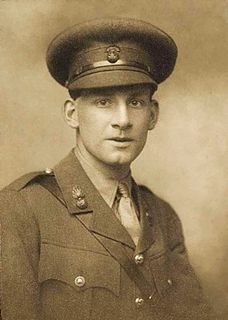Top 36 Quotes & Sayings by Siegfried Sassoon
Explore popular quotes and sayings by an English poet Siegfried Sassoon.
Last updated on April 18, 2025.
I am making this statement as an act of wilful defiance of military authority, because I believe that the War is being deliberately prolonged by those who have the power to end it. I am a soldier, convinced that I am acting on behalf of soldiers. I believe that this War, on which I entered as a war of defence and liberation, has now become a war of aggression and conquest.
Across the land a faint blue veil of mist
Seems hung; the woods wear yet arrayment sober
Till frost shall make them flame; silent and whist
The drooping cherry orchards of October
Like mournful pennons hang their shriveling leaves
Russet and orange: all things now decay;
Long since ye garnered in your autumn sheaves,
And sad the robins pipe at set of day.
How innocent were these Trees, that in
Mist-green May, blown by a prospering breeze,
Stood garlanded and gay;
Who now in sundown glow
Of serious colour clad confront me with their show
As though resigned and sad,
Trees, who unwhispering stand umber, bronze, gold;
Pavilioning the land for one grown tired and old;
Elm, chestnut, aspen and pine, I am merged in you,
Who tell once more in tones of time,
Your foliaged farewell.
EVERYONE suddenly burst out singing; And I was filled with such delight As prisoned birds must find in freedom, Winging wildly across the white Orchards and dark-green fields; on—on—and out of sight. Everyone’s voice was suddenly lifted; And beauty came like the setting sun: My heart was shaken with tears; and horror Drifted away ... O, but Everyone Was a bird; and the song was wordless; the singing will never be done.
October's bellowing anger breakes and cleavesThe bronzed battalions of the stricken woodIn whose lament I hear a voice that grievesFor battle's fruitless harvest, and the feudOf outrage men. Their lives are like the leavesScattered in flocks of ruin, tossed and blownAlong the westering furnace flaring red.O martyred youth and manhood overthrown,The burden of your wrongs is on my head.
December stillness, teach me through your trees That loom along the west, one with the land, The veiled evangel of your mysteries. While nightfall, sad and spacious, on the down Deepens, and dusk embues me where I stand, With grave diminishings of green and brown, Speak, roofless Nature, your instinctive words; And let me learn your secret from the sky, Following a flock of steadfast-journeying birds In lone remote migration beating by. December stillness, crossed by twilight roads, Teach me to travel far and bear my loads.
For it is humanly certain that most of us remember very little of what we have read. To open almost any book a second time is to be reminded that we had forgotten well-nigh everything that the writer told us. Parting from the narrator and his narrative, we retain only a fading impression; and he, as it were, takes the book away from us and tucks it under his arm.























